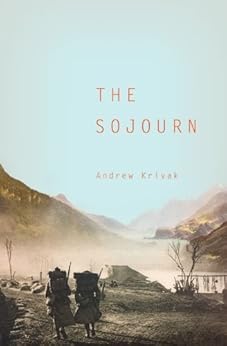3.5 Stars
The Sojourn is a bildungsroman, a novel about the formative years of Josef Vinich. Josef is born in the United States, but his father brings him to his hometown in Austria-Hungary after a family tragedy. The book focuses on Josef's sojourn in Europe. He becomes a shepherd in the Carpathian Mountains where, under the tutelage of his father, he learns English and the skills of a shepherd and a hunter. As is the wont of young men, Josef sets out to make a better life than that of his father so he enlists, along with his cousin Zlee, and the two are trained as snipers who serve on the losing side on the southern front.
The Sojourn is a bildungsroman, a novel about the formative years of Josef Vinich. Josef is born in the United States, but his father brings him to his hometown in Austria-Hungary after a family tragedy. The book focuses on Josef's sojourn in Europe. He becomes a shepherd in the Carpathian Mountains where, under the tutelage of his father, he learns English and the skills of a shepherd and a hunter. As is the wont of young men, Josef sets out to make a better life than that of his father so he enlists, along with his cousin Zlee, and the two are trained as snipers who serve on the losing side on the southern front.
As is expected, Jozef is a dynamic character. The reader
sees Josef's transformation from a naive, starry-eyed soldier to a
disillusioned veteran. His change is certainly convincing. He is capable of
change since he is young, even enlisting underage. His wartime experiences
certainly provide him with motivation to change, and he has sufficient time to
change because he spends 2 1/2 years as a soldier/prisoner-of-war. Josef's
conversations with Banquo show him learning that "'life itself may prove
to be the most worthy struggle. . . .it cannot be seen, planned, or even known.
It is simply lived" (144). Likewise, Josef's encounter with a Gypsy girl
as he makes his way home after the war clearly shows the extent of his maturation:
for example, he discards the "mistrust [of Roma] around which [he] had
been raised" (152).
Besides being a coming-of-age book, The Sojourn is also a World War I novel in the vein of All Quiet on the Western Front by Erich
Maria Remarque and The Wars by Timothy
Findley. In its insight into the mind of a sniper, it is very reminiscent of Three Day Road by Joseph Boyden about
two Cree men, best friends who enlist and become snipers in the battlefields of
France and Belgium.
The book is also a love story, detailing the love between a
father and son and between brothers. The bond that develops beween Josef and
Zlee is delineated very clearly and, again, I could not but be reminded of the
relationship between Xavier and Elijah in Three
Day Road a book, like The Sojourn,
based on the author's family history.
This book will certainly appeal to patriotic Americans in
its endorsement of the American Dream. Ondrej Vinich unsuccessfully pursues the
American Dream and returns to his homeland, but he continues to yearn for
America, insisting that English be the only language spoken during their annual
sojourns in the mountains with the sheep. Before his death, he leaves his son
"everything [he] needed to leave Pastvina and go to the United
States" (184). Jozef narrates the story from his home in Dardan,
Pennsylvania, so one can assume that he succeeded where his father failed. In
the end, Josef, like the Gypsy's child, is returned to his tribe who nurse and
coddle him in the promise that he will become a king (180). He even refers to
his time in Europe as a sojourn, a temporary stay in "'the ol'
kawntree'" (190).
An aspect of the book that is problematic is sentence
structure. The author has several very long sentences whose meaning is lost in
verbosity. 100+-word sentences are not unusual, especially in the second
section. These convoluted sentences, though grammatically correct, are clinical
and dispassionate, and fail to emotionally convey the atrocities of war. The
reader is also left to question some of the arcane diction as in "never
did I sense any form of boredom or acedia" (99). With both a Masters and
PhD, Andrew Krivak is certainly intelligent and well-educated, but the reader
is sometimes left feeling that he is writing to impress. The language given to
Josef, the narrator, seems inappropriate, even though, at the time of his
telling his tale, he is a septuagenarian who has had ample time for learning.
The book is a worthwhile read, although I would not place it
in the list of my all-time favourite reads.

No comments:
Post a Comment